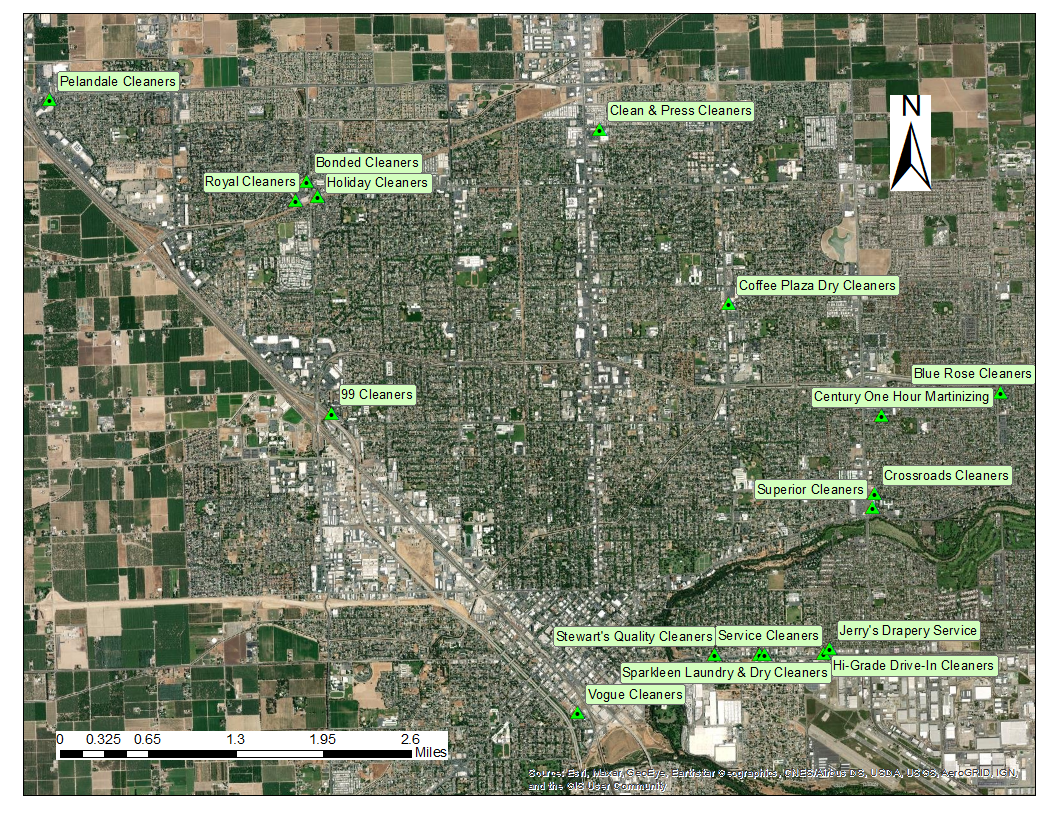Modesto Dry Cleaner Investigation
The California Department of Public Health (CDPH), supported by the federal Agency for Toxic Substances and Disease Registry (ATSDR), studied 17 dry cleaners in the City of Modesto. In the past, these dry cleaners used a cleaning chemical called tetrachloroethylene (PCE) that was spilled on the ground. We examined the potential health impacts of PCE exposure on residents and workers.
Map of the Modesto Dry Cleaners CDPH Studied
Dry cleaners studied: Pelandale Cleaners, Bonded Cleaners, Royal Cleaners, Holidays Cleaners, 99 Cleaners, Clean and Press Cleaners, Coffee Plaza Dry Cleaners, Century One Hour Martinizing, Blue Rose Cleaners, Crossroads Cleaners, Superior Cleaners, Vogue Cleaners, Stewart’s Quality Cleaners, Service Cleaners, Jerry’s Drapery Service, High-Grade Drive-In Cleaners, Sparkleen Laundry and Dry Cleaners.
What did CDPH do in Modesto?
CDPH reviewed information about the dry cleaners and studied data from samples collected in the ground, soil gas (from under buildings or sub-slab foundations), and air inside of buildings. PCE in the ground can get in the air inside buildings through a process called vapor intrusion (see “What is vapor intrusion?” below). We investigated how dry cleaning chemicals like PCE could affect the quality of air inside buildings.
We documented our findings and health-based recommendations in reports called health consultations. We also wrote summaries of our reports and sent the summaries to homes and businesses located near the dry cleaners we studied. Our health consultation reports and summaries can be obtained or requested below.
Completed investigations:
"Service Cleaners" "Sparkleen Laundry and Dry Cleaner" | 1425 La Loma Avenue 1511 Yosemite Boulevard | Health Consultation CDPH (PDF) or Health Consultation ATSDR (PDF)
For a copy in Spanish, Please contact Beth Saiki, Health Educator, at (510) 620-5764 or email at: Beth.Saiki@cdph.ca.gov | Summary (PDF)
For a copy in Spanish, Please contact Beth Saiki, Health Educator, at (510) 620-5764 or email at: Beth.Saiki@cdph.ca.gov | March 2018 |
"Jerry's Drapery Service" "Hi-Grade Drive-In Cleaners" | 123 Phoenix Avenue 1915 Yosemite Boulevard | Health Consultation (PDF)
For a copy in Spanish, Please contact Beth Saiki, Health Educator, at (510) 620-5764 or email at: Beth.Saiki@cdph.ca.gov | Summary (PDF) For a copy in Spanish, Please contact Beth Saiki, Health Educator, at (510) 620-5764 or email at: Beth.Saiki@cdph.ca.gov | August 2019 |
| "Vogue Cleaners" | 409 7th Street | For a copy in English and/or Spanish, Please contact Beth Saiki, Health Educator, at (510) 620-5764 or email at: Beth.Saiki@cdph.ca.gov | For a copy in English and/or Spanish, Please contact Beth Saiki, Health Educator, at (510) 620-5764 or email at: Beth.Saiki@cdph.ca.gov | March 2020 |
"12 Sites"
(please refer to above map for list of the 12 sites studied) | Addresses
(please refer to the 12 sites summary) | For a copy in English and/or Spanish, Please contact Beth Saiki, Health Educator, at (510) 620-5764 or email at: Beth.Saiki@cdph.ca.gov | For a copy in English and/or Spanish, Please contact Beth Saiki, Health Educator, at (510) 620-5764 or email at: Beth.Saiki@cdph.ca.gov | September
2021
|
History of dry cleaner investigations in Modesto
Since 2001, the City of Modesto has been investigating toxic chemicals released into the soil and groundwater from dry cleaners. The City signed Voluntary Cleanup Agreements with the California Department of Toxic Substances Control (DTSC) for several dry cleaners. DTSC is the California regulatory agency overseeing the investigations and cleanup of the former dry cleaners in Modesto. In April 2010, DTSC asked CDPH for assistance evaluating and responding to the Modesto community’s health concerns regarding exposures to chemicals released from dry cleaners located near their home or business. We reached out to the Modesto community to collect their concerns.
Modesto community concerns
Community members relayed concerns about the safety of their soil, drinking water, and air. The dry cleaner sites are paved, preventing contact with contaminated soil. PCE vapors will not pollute your garden soil and vegetables, or your outdoor air. The City of Modesto regularly checks the public drinking water to ensure it meets all safe drinking water standards.
What is vapor intrusion?
All soils contain tiny air pockets, like the tiny holes in a sponge. The air in those pockets is called soil gas. Vapor intrusion occurs when a chemical like PCE, which evaporates quickly, mixes with soil gas, rises and enters a building through utility lines (sewer or plumbing), cracks in a foundation (such as a concrete sub-slab), a basement floor, or other openings. The amount of soil gas that moves into a building depends on the soil type; how moist the soil is (its dryness or dampness); a building’s air conditioning and heating settings; the amount of time residents keep windows open; the type and condition of the building’s floor (cracks in the concrete, holes for utilities), and other influences. Once inside a building, the soil gas mixture can blend into the indoor air where people could inhale it.
To learn more, visit our webpage on Vapor Intrusion.
What is PCE and what are its health effects?
PCE is a solvent that was used by many dry cleaners in the past. It is commonly found in the outdoor air and in the indoor air of homes and other buildings. PCE can be found in some home cleaning products such as paint thinners and spot removers. ATSDR reports that exposure to PCE might harm the nervous system, liver, kidneys, reproductive system, and might increase one’s risk of getting bladder or certain blood-related cancers. Although scientists do not know if children are more at risk than adults to the effects of PCE, some studies suggest it could harm unborn children.
Our investigations cannot predict if an exposed person will develop health effects. This depends on how much PCE a person is exposed to (how often and how long), exposures to other chemicals, and the age, sex, diet, heredity, lifestyle, and health of the person exposed. You can find more information on PCE and its health effects here:
Factsheet on Tetrachloroethylene or PCE (in English and Spanish):